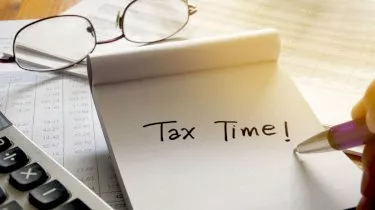Save
Negative gearing tax benefits
People commonly start investing in order to generate income and meet financial objectives. Some investors, however, are prepared to accept losses in exchange for future gain – and one of the ways they generate loss is through negative gearing.
Negative gearing tax benefits
People commonly start investing in order to generate income and meet financial objectives. Some investors, however, are prepared to accept losses in exchange for future gain – and one of the ways they generate loss is through negative gearing.

Gearing is a strategy wherein borrowed money is used to purchase an investment asset. Negative gearing is when the interest on the loan amount exceeds its net rental income.
Some property investors negatively gear their investment property to claim tax offsets that are allowed by the Australian Taxation Office (ATO). Below are the three tax benefits of negative gearing that investors can claim.
Tax deduction
Tax loss
Marginal tax rate adjustment
Tax deduction
At the time that the property was rented or was genuinely available for rent, negative gearers may claim the full amount of their net rental loss as a tax deduction. That is, the full amount is deducted from their tax payable for the relevant income year.

Doing so effectively lowers the amount of tax the investor has to pay and can even bring it down to nil.
Tax loss
In cases wherein the net rental income exceeds the investor’s tax payable, they may carry over and apply the remaining loss to the next financial year.
Individual investors may indefinitely carry forward their tax loss, but they are not allowed to let their losses accumulate to be used at a time of their choosing. Likewise, they cannot choose which loss to apply first because ATO rules require that “losses must be claimed in the order in which they were incurred”.
Marginal tax rate adjustment
Another option for those whose net rental loss exceeds their tax payable is to request the ATO to adjust effective marginal tax rate or the amount that is withheld from their income.
This means that, instead of simply deducting losses from their tax payable, they may request to apply the tax loss on their assessable income so that they may be classified into a lower tax bracket.
Isn’t buying a losing investment too risky?
Most investors naturally avoid investments that expose them to great risks and are sure to lose money, so what could possibly entice some to accept risk and income loss from negative gearing?
There are two things that make negative gearing attractive:
- Tax benefits
- Potential capital growth
Tax benefits
The tax benefits negative gearers may claim have been discussed above. However, investors can only benefit from tax offsets if they satisfy the conditions set by the ATO. Only the following expenses may be claimed immediately:
- Expenses that are directly paid for by investors
- Expenses incurred during the time the property was rented or was genuinely available for rent
On the other hand, tax deductions on the following expenses must be spread out over several income years:
- Capital works spending
- Decline in value of depreciating assets
- Borrowing expenses
With an effective strategy for a negatively geared property, an investment property could be paid off using the investor’s extra income and the property’s rent income and tax deductions from the ATO.
Potential capital growth
In most cases, carefully selected negatively geared properties are located in areas with a good potential for value appreciation. This means that, with a properly selected negatively geared property, the gains can outweigh the losses once the property is sold.
Despite potentially large future gains, however, investors must remember that gearing strategies are more complex than they seem. It is highly recommended that they do due diligence and seek the advice of a licensed professional before making any investment decision.
This information has been sourced from the Australian Taxation Office, the Australian Securities and Investments Commission and Smart Property Investment.
About the author

About the author


Tax saving
$20,000 instant asset write-off extension welcomed, but calls for broader support grow
The Australian government's decision to extend the $20,000 instant asset write-off into the next financial year has been met with approval from business leaders. However, there are growing calls for ...Read more

Tax saving
The downsizer dividend: How targeted tax levers could unlock housing supply in Australia
A call by Raine & Horne to incentivise seniors to move to smaller homes has kicked off a wider policy conversation that reaches well beyond real estate. If designed well, a targeted package could ...Read more

Tax saving
Raine & Horne's bold move could unlock housing supply but what are the hidden risks
Raine & Horne’s call for targeted tax incentives to encourage empty nesters to ‘rightsize’ isn’t just another sector wish list; it’s a potential lever to free up family homes, ease rental ...Read more

Tax saving
From annual check-ups to always‑on: how modern portfolio reviews unlock after‑tax alpha
The era of once‑a‑year portfolio check‑ins is over. Continuous, tech‑enabled reviews now drive returns through tax efficiency, risk control and behavioural discipline—especially in a high‑rate ...Read more

Tax saving
Navigating tax laws for capital gains in 2023
The landscape of Australian tax laws surrounding capital gains is ever-changing, with 2023 being no exception. Read more

Tax saving
What you need to know about the tax implications of crypto
One million Aussies are now invested in crypto, but many have not thought about how these investments will affect them at tax time. Read more

Tax saving
Welfare overhaul could give recipients a leg-up
Australia’s Centrelink recipients who’ve been doing it tough are in for a potentially easier time if the federal government pursues ambitious reforms that could provide sturdier safety nets. Read more

Tax saving
Students should think twice before tapping into their super
Former students might want to think carefully before they look to take advantage of the federal government’s biggest first home buyer incentive. Read more

Tax saving
$20,000 instant asset write-off extension welcomed, but calls for broader support grow
The Australian government's decision to extend the $20,000 instant asset write-off into the next financial year has been met with approval from business leaders. However, there are growing calls for ...Read more

Tax saving
The downsizer dividend: How targeted tax levers could unlock housing supply in Australia
A call by Raine & Horne to incentivise seniors to move to smaller homes has kicked off a wider policy conversation that reaches well beyond real estate. If designed well, a targeted package could ...Read more

Tax saving
Raine & Horne's bold move could unlock housing supply but what are the hidden risks
Raine & Horne’s call for targeted tax incentives to encourage empty nesters to ‘rightsize’ isn’t just another sector wish list; it’s a potential lever to free up family homes, ease rental ...Read more

Tax saving
From annual check-ups to always‑on: how modern portfolio reviews unlock after‑tax alpha
The era of once‑a‑year portfolio check‑ins is over. Continuous, tech‑enabled reviews now drive returns through tax efficiency, risk control and behavioural discipline—especially in a high‑rate ...Read more

Tax saving
Navigating tax laws for capital gains in 2023
The landscape of Australian tax laws surrounding capital gains is ever-changing, with 2023 being no exception. Read more

Tax saving
What you need to know about the tax implications of crypto
One million Aussies are now invested in crypto, but many have not thought about how these investments will affect them at tax time. Read more

Tax saving
Welfare overhaul could give recipients a leg-up
Australia’s Centrelink recipients who’ve been doing it tough are in for a potentially easier time if the federal government pursues ambitious reforms that could provide sturdier safety nets. Read more

Tax saving
Students should think twice before tapping into their super
Former students might want to think carefully before they look to take advantage of the federal government’s biggest first home buyer incentive. Read more













